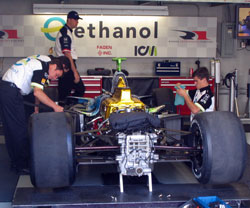 Welcome to race day at the Indianapolis Motor Speedway. Today we’ll have coverage from the 90th running of the Indianapolis 500.
Welcome to race day at the Indianapolis Motor Speedway. Today we’ll have coverage from the 90th running of the Indianapolis 500.
Earlybirds got to see the sun rise here. It’s promising to be a hot one which should make things interesting. All during the month of practice it’s been very cool. These car engines and drivers will be running in different conditions today than they’re used to.
I’m going to collect more pictures, audio and video with a focus on the ethanol-sponsored Rahal-Letterman team and the #17 Ethanol Car.


 There are a lot of ethanol supporters here in Indianapolis and more arriving by the minute as we get closer to race day.
There are a lot of ethanol supporters here in Indianapolis and more arriving by the minute as we get closer to race day. Today has been a relatively quiet day here in Indianapolis. Except for the annual parade that is.
Today has been a relatively quiet day here in Indianapolis. Except for the annual parade that is.
 On my way out of the track today I stopped by the Chevrolet exhibit area. It’s huge. They’ve got pace car Corvettes from past races on display and a selection of AFV’s as well.
On my way out of the track today I stopped by the Chevrolet exhibit area. It’s huge. They’ve got pace car Corvettes from past races on display and a selection of AFV’s as well. One of the highlight events on Carb Day here at Indy is the Checkers/Rally’s Pit Stop Competition.
One of the highlight events on Carb Day here at Indy is the Checkers/Rally’s Pit Stop Competition. The big announcement from
The big announcement from 
 Here’s a little tidbit of information I just learned of.
Here’s a little tidbit of information I just learned of. The
The  The 2004 Indy 500 winner is the third Rahal-Letterman team driver. He’s Buddy Rice and he addressed the Ethanol Summit yesterday.
The 2004 Indy 500 winner is the third Rahal-Letterman team driver. He’s Buddy Rice and he addressed the Ethanol Summit yesterday. The Ethanol Car crew is hard at work doing that last minute tweaking.
The Ethanol Car crew is hard at work doing that last minute tweaking.